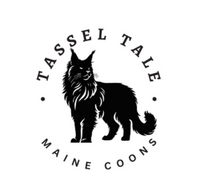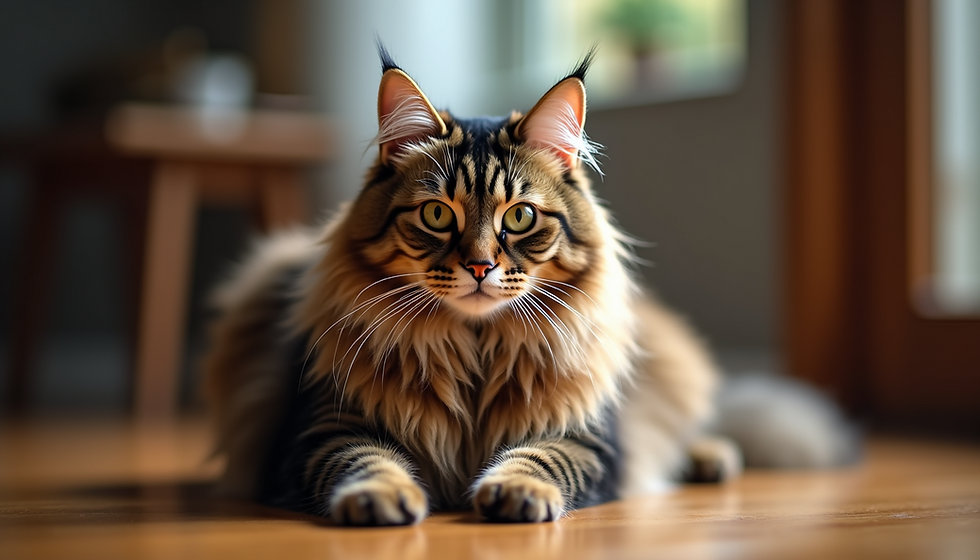Protecting Yourself from Maine Coon Scams: A Guide for Pet Buyers
- Tiffany

- Jul 23, 2025
- 3 min read
Updated: Aug 13, 2025
Understanding the Allure of Maine Coons
Maine Coon cats, with their regal size, tasseled ears, and friendly, dog-like personalities, have captured the hearts of cat lovers worldwide. Their popularity, however, has a downside: it’s made them a prime target for scammers. As someone looking to bring a Maine Coon into your home, you need to be vigilant to avoid falling prey to fraudulent breeders or sellers. Let’s dive into the world of Maine Coon scams, how to spot them, and ways to ensure you’re dealing with a reputable source.
Why Are Maine Coons Prone to Scams?
First, why are Maine Coons so prone to scams? Their desirability drives demand. These cats, known for their large stature—males can weigh 13 to 25 pounds or more—and unique traits, like bushy tails and sociable natures, are often sold at premium prices. Prices can range from $2,500 to $5,000 or higher for titled or champion pedigrees. Scammers exploit this by posing as legitimate breeders, luring buyers with promises of “cheap” or “rare” Maine Coons. Unfortunately, many end up with no cat, a sick animal, or one that’s not even a Maine Coon.
Common Scams to Watch For
One common scam is the social media-only breeder. These fraudsters create polished sites with adorable kitten photos—often stolen from real breeders—and offer Maine Coons at suspiciously low prices. They may claim the kittens are TICA- or CFA-registered, but when pressed, they provide vague or no documentation.
Red Flags to Identify Scammers
Refusing any type of video call so you can see the kitten live and where they are raised is a significant red flag. If they insist on payment through untraceable methods, like wire transfers, gift cards, or cryptocurrency, and refuse in-person visits, it’s time to walk away. Legitimate breeders welcome video visits to their cattery, showing you the kittens and their parents in a clean, caring environment. Many have moved towards closed catteries to prevent viral, bacterial, and parasite transmission that could hitch a ride on unassuming customers' clothes and shoes.
If a seller pushes for quick payment or avoids video calls to show the kitten, it’s best to steer clear. Another tactic is the “bait-and-switch.” Scammers advertise purebred Maine Coons but deliver a cat that’s a mix or entirely different breed.

Identifying Genuine Maine Coons
Maine Coons have very distinct features—large, rectangular bodies, tufted ears, long furry tails, and square muzzled faces—but without proper papers or genetic testing, you might end up with a look-alike. Always ask for pedigree papers and health records, including screenings for common Maine Coon issues like hypertrophic cardiomyopathy or hip dysplasia. Reputable breeders provide these willingly and often include a contract with health guarantees.
Navigating Social Media and Classifieds
Social media and classified sites like Craigslist are hotspots for scams. Posts with sob stories—like needing to rehome a Maine Coon due to a sudden move—tug at heartstrings but often lead to fake transactions. Similarly, fake rescue groups may claim to have Maine Coons available for adoption, only to vanish after you send a deposit.
Verifying Seller Identity
To avoid this, verify the seller’s identity. Check if they’re registered with cat associations like TICA or CFA, and search their name or cattery on forums like Reddit’s r/MaineCoon, where owners share experiences about trustworthy breeders. Protecting yourself starts with research. Use resources like the Cat Fanciers’ Association (CFA), Maine Coon Cat Nation, or The International Cat Association (TICA) to learn about the breed standard and find breeder directories.
Building Connections with Breeders
Contact multiple breeders, ask for references, and connect with past buyers. If adopting, stick to established shelters or rescues listed on sites like Petfinder, though purebred Maine Coons are rare in these settings. Be wary of deals that seem too good to be true—low prices often signal fraud.
Trusting Your Instincts
Finally, trust your gut. If a seller’s story feels off or they’re evasive, don’t proceed. By staying informed and cautious, you can avoid scams and find a healthy, happy Maine Coon to join your family. It’s heartbreaking that scammers target such a beloved breed, but with these tips, you’re better equipped to navigate the process safely.
Conclusion: Your Journey to a Maine Coon
In conclusion, bringing a Maine Coon into your home should be a joyful experience. By understanding the potential scams and knowing how to protect yourself, you can ensure that you find a loving companion. Remember, the journey to finding your perfect Maine Coon is just as important as the destination. With careful research and a discerning eye, you can welcome a beautiful Maine Coon into your family, enriching your life with their charm and affection.




Comments